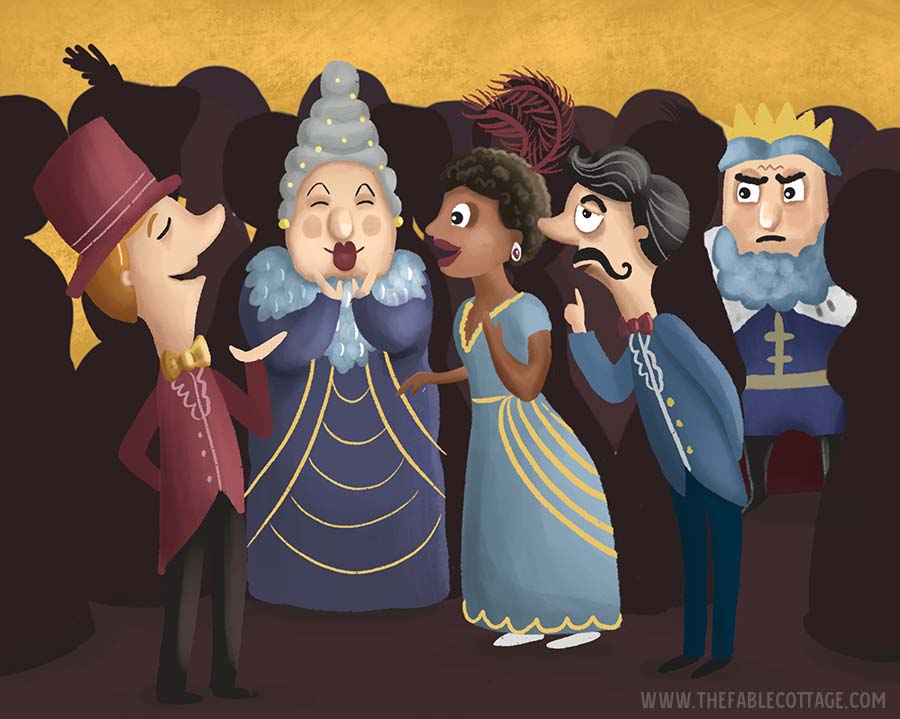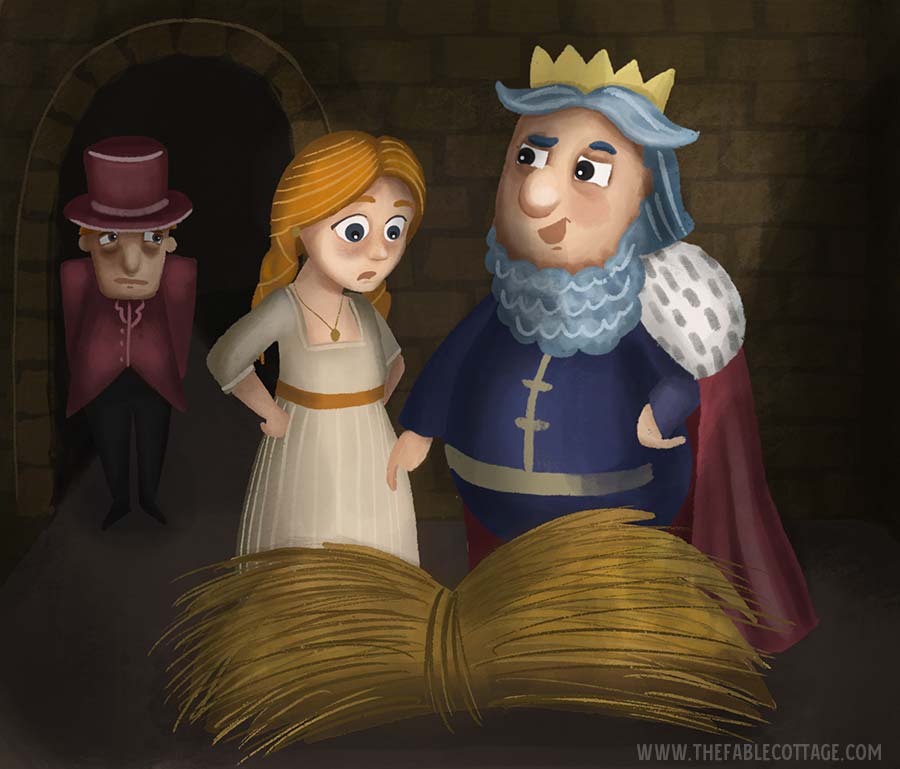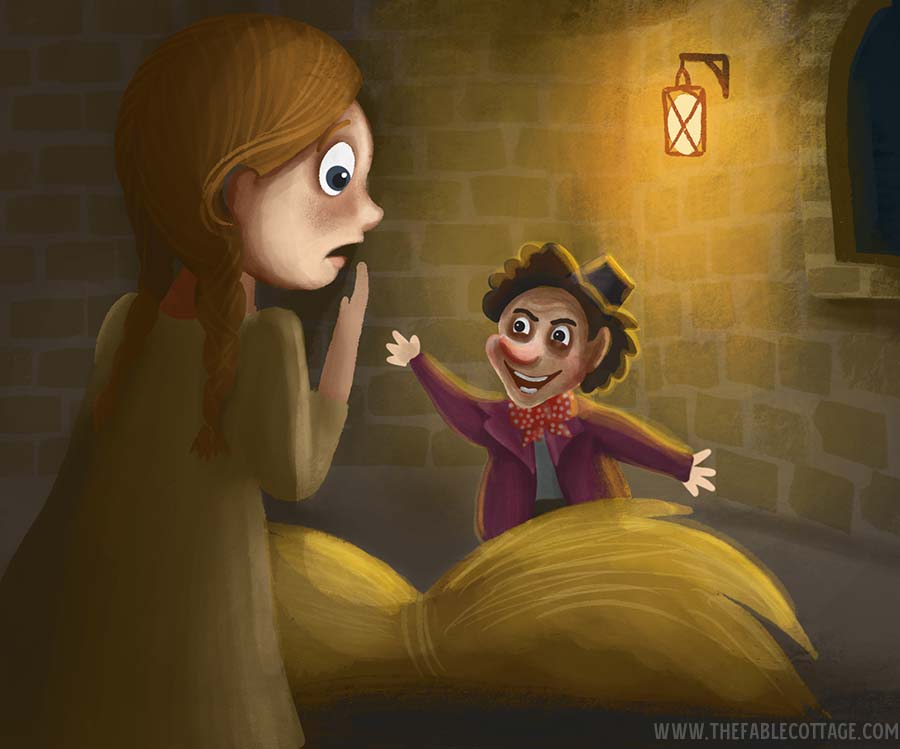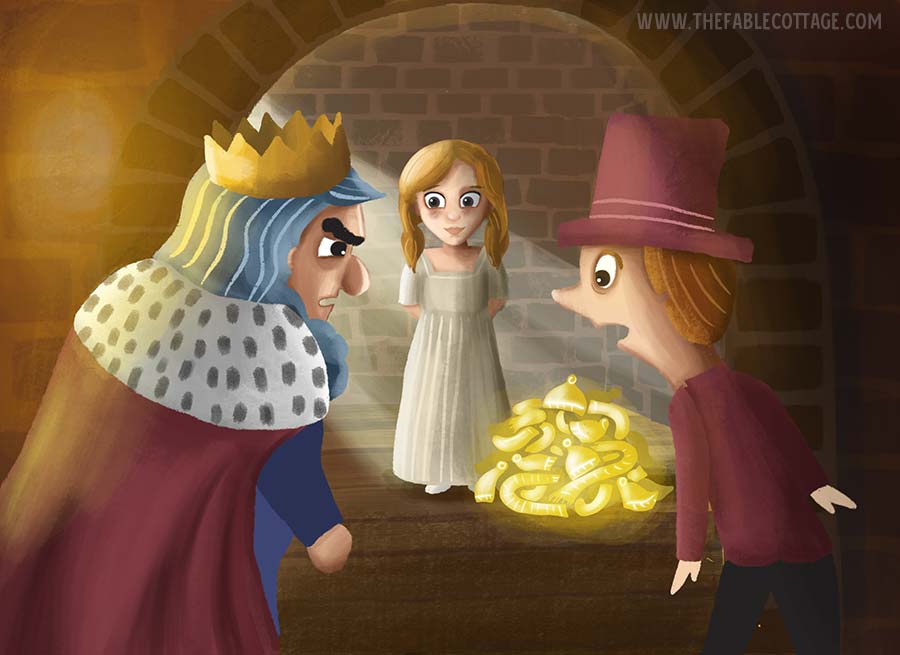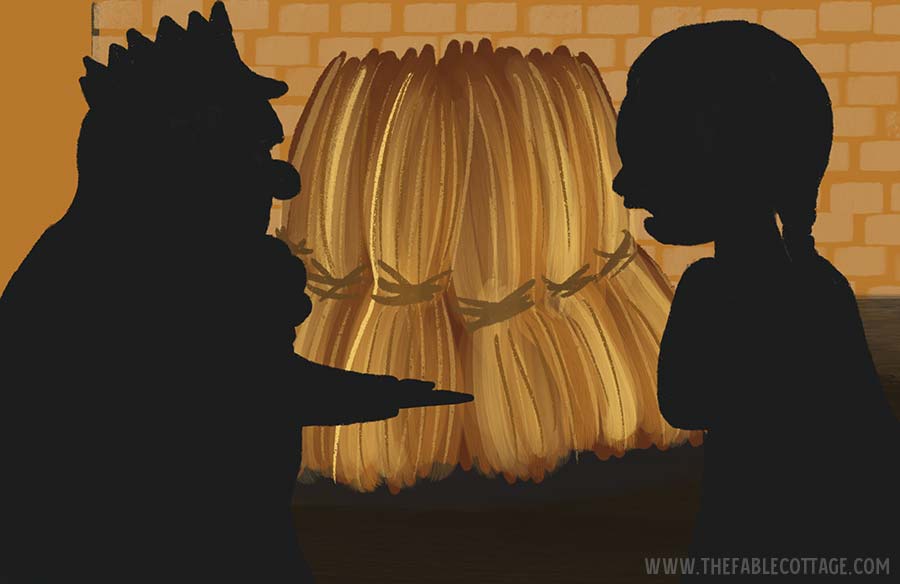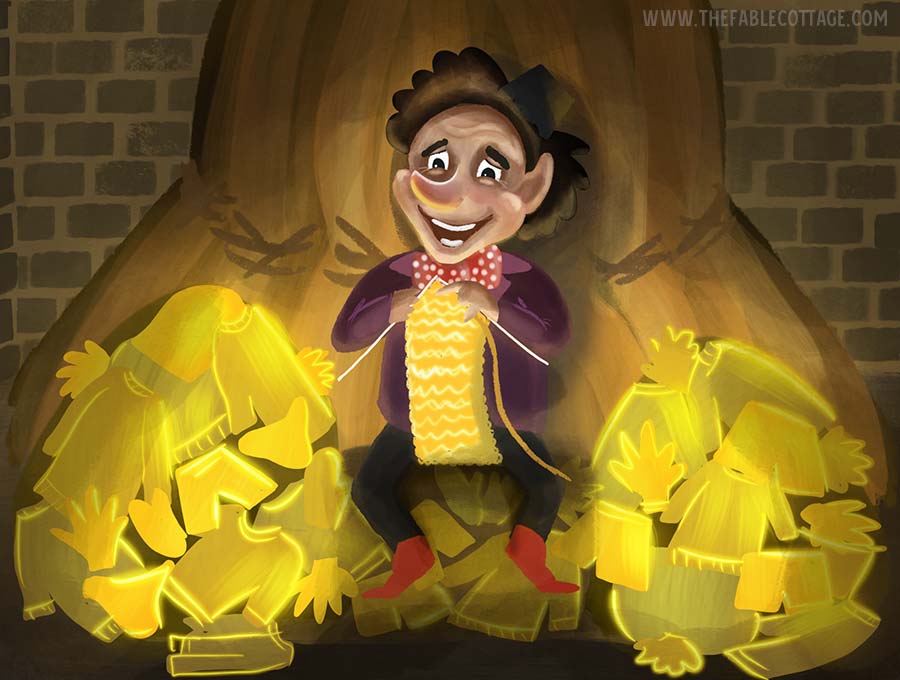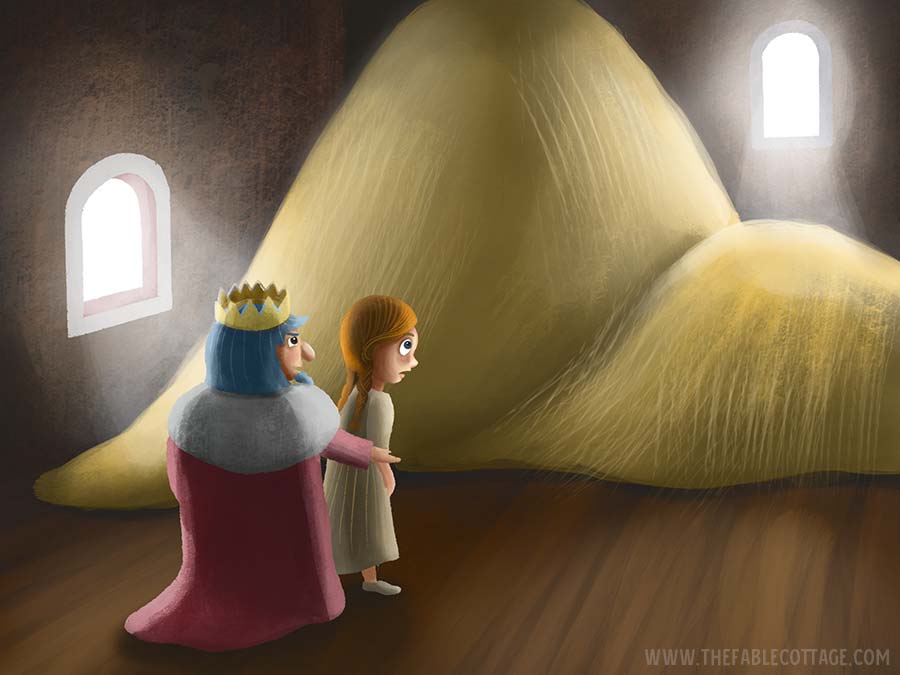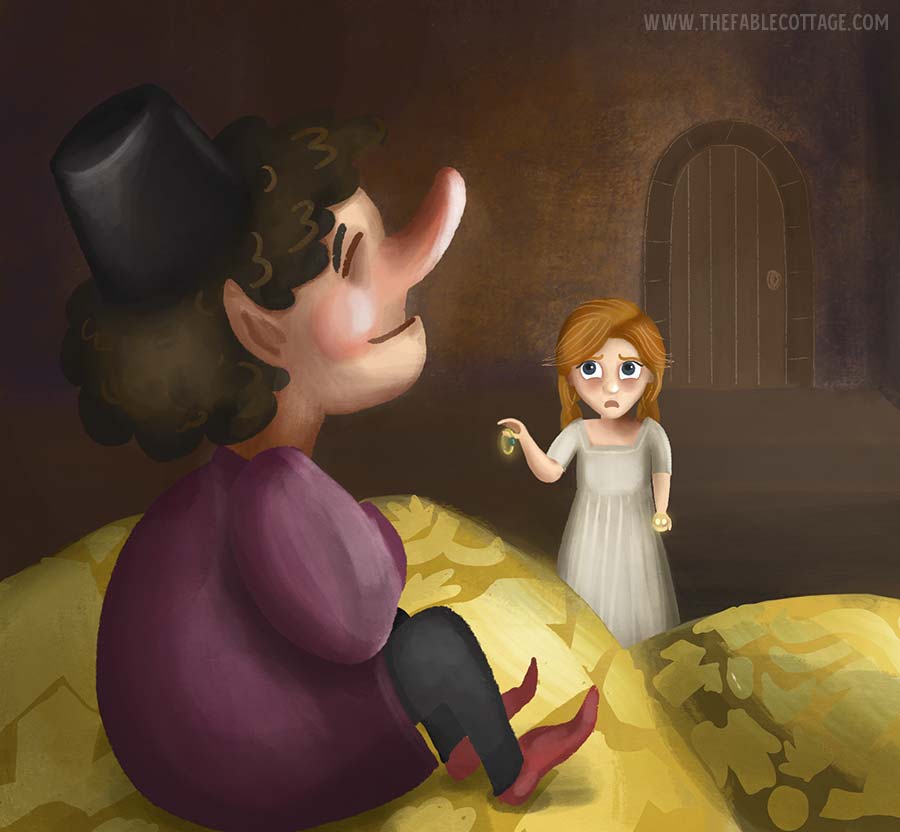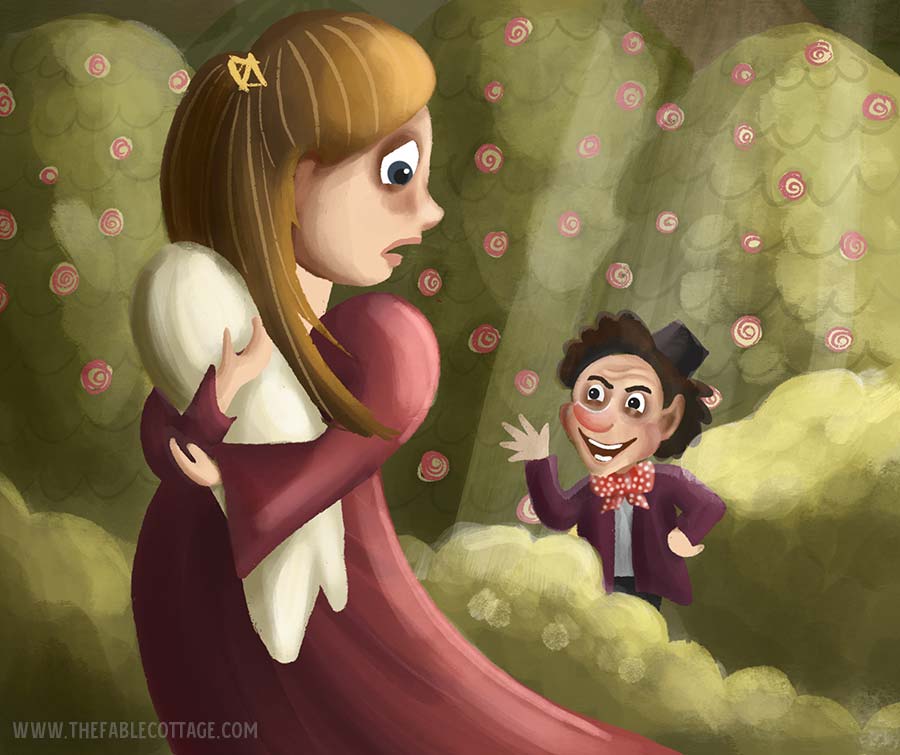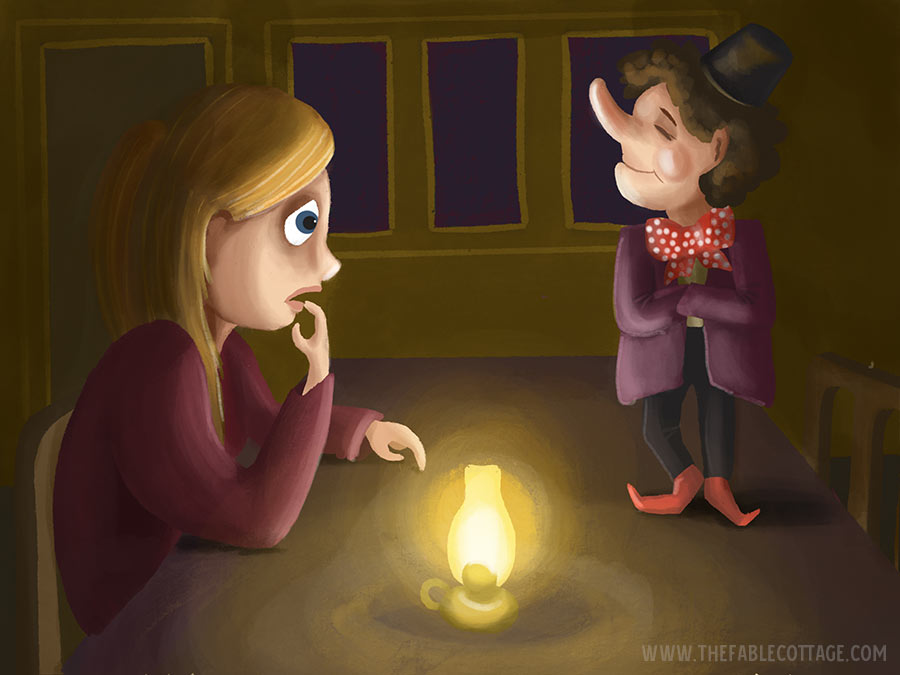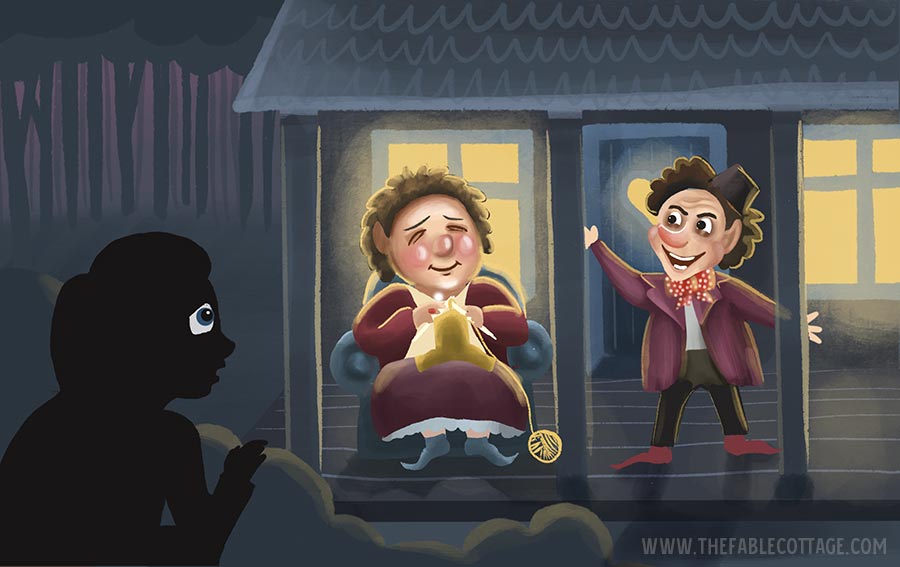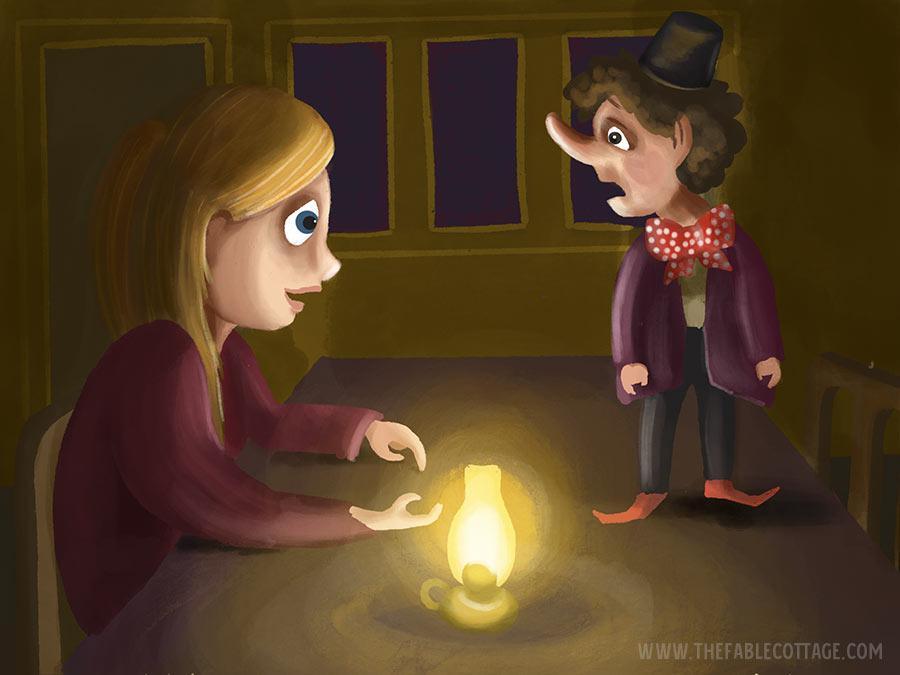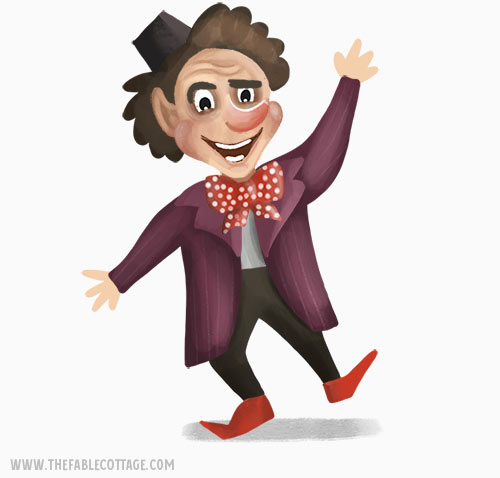Il était une fois un riche chapelier. Il racontait beaucoup de mensonges. Mais il était si riche que ça ne dérangeait personne.
« Oh, il ne fait que plaisanter ! » riaient les gens.
Once upon a time there was a rich hat maker. He told a lot of lies. But he was so rich that this didn't bother anyone.
"Oh, he's just joking!" people laughed.
Ce riche homme aimait aller danser avec d’autres gens riches. Lors des danses, les gens riches se racontaient des mensonges.
This rich man loved to go to dances with other rich people. At the dances, the rich people told each other lies.
« Mon mari a tiré une dinde à trois kilomètres de distance... » dit une riche dame.
« Mon fils est si intelligent qu’il enseigne à ses professeurs ! » dit un homme riche.
« Mon chat est si rusé qu’il rapporte les balles, comme un chien ! » dit une autre riche dame.
"My husband shot a turkey from three kilometers away ..." said a rich lady.
"My son is so smart that he teaches his teachers!" said a rich man.
"My cat is so clever that he fetches (brings back) balls, like a dog!" said another rich lady.
Le riche chapelier voulait se joindre à la conversation, alors il dit son plus gros mensonge à ce jour :
« Ma fille est tellement merveilleuse qu’elle peut changer le foin en or ! »
The rich hat maker wanted to join the conversation, so he told his biggest lie to date:
"My daughter is so wonderful, (that) she can turn hay into gold!"
Et tous les gens riches hochèrent la tête et sourirent:
« Oui, oui », dirent-ils. « C’est merveilleux. »
And all the rich people nodded and smiled:
"Oh yes," they said. "That's wonderful."
Soudain une voix forte résonna au fond de la salle.
« ELLE PEUT CHANGER LE FOIN EN OR ?! »
C’était le roi ! Tout le monde s’inclina et eut le souffle coupé lorsqu’il se rapprocha du chapelier.
Suddenly a loud voice echoed in the back of the room:
"SHE CAN TURN HAY INTO GOLD?"
It was the king! Everyone bowed and gasped (had their breath cut) as he approached the hat maker.
« AVEZ-VOUS DIT QU’ELLE POUVAIT CHANGER LE FOIN EN OR ? »
« Heu... eh bien... ce que je voulais dire, c’est que... hmm... Oui ? » bégaya le chapelier.
"DID YOU SAY THAT SHE CAN TURN HAY INTO GOLD?"
"Ummm... well... what I meant was that... errr... yes?" stammered the hat maker.
« AMENEZ-LA-MOI ! » beugla le roi. Il se précipita hors de la salle.
« Oh seigneur », pensa le chapelier. « Qu’est ce que je vais faire ? »
"BRING HER TO ME!" the king bellowed. He stormed (rushed) out of the room.
"Oh lord," thought the hat maker. "What have I done?"
Le lendemain matin, le chapelier amena sa fille, Sophie, dans une petite pièce du palais.
Sophie était très confuse.
« Pourquoi suis-je ici ?»
The next morning, the hat maker brought his daughter, Sophie, to a small room in the palace.
Sophie was very confused.
"Why am I here?"
« Ton père est un menteur », expliqua le roi. « La nuit dernière il a dit que tu pouvais changer le foin en or. Je pense que c’est un mensonge ! Et je HAIS les menteurs. »
"Your father is a liar," explained the king. "Last night he said you could turn hay into gold. I think that is a lie! And I HATE liars!"
« Voici une botte de foin », dit le roi. « Change-la en or, s’il-te-plaît. Ce doit être fait pour demain matin. »
"Here is a bundle of hay," said the king. "Turn it into gold, please. It must be done by tomorrow morning."
Sophie eut le souffle coupé.
« Oh et encore une chose », dit le roi. « Si tu échoues, je vais donner ton père à manger aux crocodiles. Je HAIS les menteurs... »
Sophie gasped. (Lit: "had her breath cut")
"Oh and one more thing," said the king. "If you fail, I will feed your father to my crocodiles. I HATE liars..."
Tout le monde partit. Sophie était seule.
« Oh mon Dieu » pensa Sophie. « Que vais-je faire maintenant ? »
Everyone left. Sophie was alone.
"Oh my God," thought Sophie. "What am I going to do now?"
La nuit tomba. Sophie était en colère.
« C’est ridicule ! » enrageait-elle. « Je ne peux pas changer le foin en or ! C'est impossible! »
Night fell. Sophie was angry.
"This is ridiculous!" she fumed. "I can't change hay into gold! That's impossible!"
C’est alors qu’elle entendit un étrange petit rire...
« Maa haa haa ... Qu’est-ce que tu as pour moi ? »
Then she heard a strange little laugh...
"Hee hee hee... What do you have for me?"
Un étrange petit homme apparut dans un coin de la pièce. Il était très petit. Il avait des cheveux bruns bouclés, un chapeau noir et des chaussures rouges pointues.
A strange little man appeared in a corner of the room. He was very small. He had curly brown hair, a black hat, and red pointy shoes.
« As-tu besoin d’aide, ma chère? » dit le petit homme.
« Je dois changer ce foin en or », soupira Sophie. « C’est ridicule ! C'est impossible! »
"Do you need help, my dear?" said the little man.
"I must change this hay into gold," sighed Sophie. "It's ridiculous! It's impossible!"
« Oh, c’est possible », dit le petit homme. « Je peux le faire pour toi... »
« Oui ! S’il vous plaît aidez-moi ! » supplia Sophie.
"Oh, it's possible," said the little man. "I can do it for you..."
"Yes! Please help me!" begged Sophie.
Le petit homme sortit deux aiguilles à tricoter de sa poche. Il commença à tricoter des vêtements avec le foin.
En passant entre ses aiguilles, le foin se changeait en un beau fil d’or.
The little man took two knitting needles out of his pocket. He began to knit clothes with the hay. As it passed between his needles, the hay turned into a beautiful gold thread.
Il tricota des écharpes en or. Il fabriqua des chapeaux et des chaussettes en or. Bientôt le foin avait disparu et il y avait un tas de vêtements en or sur le plancher.
« Et maintenant, qu’est-ce que tu as pour moi ? » demanda le petit homme.
He knitted gold scarves. He made gold hats and socks. Soon the hay was gone and there was a pile of gold clothes on the floor.
"And now, what do you have for me?" asked the little man.
« Ce collier de diamants ? » suggéra Sophie.
« Parfait », dit l’homme. « Il me faut un collier de diamants. »
Sophie donna son collier à l’homme. Il dit « Maa haa haa » et disparut.
"This diamond necklace?" suggested Sophie.
"Perfect," said the man. "I need a diamond necklace."
Sophie gave her necklace to the man. He said "Maa haa haa" and disappeared.
Le lendemain matin, le roi retourna dans la pièce. Il ouvrit la porte et ne put croire ce qu’il vit.
« On me joue un tour ? Comment as-tu fait ça ? » demanda-t-il.
The next morning, the king returned to the room. He opened the door and could not believe what he saw.
"Are you playing a trick on me? How did you do this?" he demanded.
Le père de Sophie passa sa tête par la porte. « Je vous l’avait dit ! Ma fille est merveilleuse. Sa mère était pareille— »
« ARRETE DE MENTIR ! » cria le roi. « Sophie, viens avec moi, je te prie. »
Sophie's father stuck his head through the door (looked into the room). "I told you! My daughter is amazing. Her mother was the same—"
"STOP LYING!" yelled the king. "Sophie, come with me please..."
Le roi mena Sophie vers une autre pièce. A l’intérieur de la pièce il y avait dix bottes de foin.
The king led Sophie to another room. Inside the room there were ten bundles of hay.
« Si tu l’as fait une fois, tu peux le refaire », dit le roi. « Ce doit être fini pour demain matin. Et cette fois je verrouille la porte ! »
"If you did it once, you can do it again," said the king. "It must be done by tomorrow morning. And this time I'm locking the door!"
Tout le monde partit. Sophie était seule. Et la porte était verrouillée.
« Oh, pour l'amour du ciel », dit Sophie.
Everyone left. Sophie was alone. And the door was locked.
"Oh for heaven's sake," said Sophie.
Cette fois, Sophie savait quoi faire. Elle regarda partout dans la pièce. Elle regarda derrière les rideaux. Elle regarda sur les étagères.
« Petit homme ? Petit homme ? Es-tu là ? »
This time, Sophie knew what to do.
She looked around the room. She looked behind the curtains. She looked on top of the shelves.
"Little man? Little man? Are you here?"
C’est alors qu’elle entendit un drôle de petit rire.
« Maa haa haa ... qu’est-ce que tu as pour moi ? »
Le petit homme apparut dans un coin de la pièce.
Then she heard a funny little laugh.
"Maa haa haa ... what do you have for me?"
The little man appeared in a corner of the room.
Une fois de plus, le petit homme sortit deux aiguilles à tricoter de ses poches. Il se mit à tricoter le foin.
Once again, the little man pulled two knitting needles out of his pockets. He began to knit the hay.
Il tricota des pulls en or. Il fabriqua des gants et des sous-vêtements en or. Bientôt il n’y eut plus de foin et il y avait un tas de vêtements en or sur le plancher.
He knitted gold sweaters. He made golden gloves and underwear. Soon there was no more hay, and there was a pile of golden clothes on the floor.
« Et maintenant, qu’est-ce que tu as pour moi ? » demanda le petit homme.
« Cette bague de rubis ? » suggéra Sophie.
"And now, what do you have for me?" asked the little man.
"This ruby ring?" suggested Sophie.
« Parfait », dit l’homme. « Il me faut une bague de rubis. »
Sophie donna sa bague à l’homme. Il dit « Maa haa haa » et disparut.
"Perfect," said the man. "I need a ruby ring."
Sophie gave her ring to the man. He said "Maa haa haa" and disappeared.
Lorsque le roi ouvrit la porte le lendemain matin, il ne put croire ce qu’il vit.
« COMMENT AS-TU FAIT CA ? » hurla-t-il. « DIS-LE-MOI ! MAINTENANT ! »
When the king opened the door the next morning, he could not believe what he saw.
"HOW DID YOU DO THIS?" he shouted. "TELL ME! NOW!"
Sophie haussa les épaules. « J’ai appris à tricoter l’hiver dernier... »
Le roi mena Sophie dans une autre pièce du palais. La pièce était entièrement remplie de foin, du plancher au plafond.
Sophie shrugged. "I learned to knit last winter..."
The king led Sophie to another room in the palace. The room was completely filled with hay, floor to ceiling.
« Voici CENT bottes de foin », dit le roi. « Et il y a dix gardes derrière la porte. Cette fois, personne ne peut t’aider...
"Here are ONE HUNDRED bundles of hay," said the king. "And there are ten guards behind the door. This time nobody can help you...
... J’espère que tu ne mens pas, chère Sophie », dit le roi, menaçant. « Souviens-toi, TOUS les menteurs seront donnés à manger aux crocodiles... »
Tout le monde partit. Sophie était seule. Et il y avait dix gardes derrière la porte.
... I hope you do not lie, dear Sophie," said the king, menacingly. "Remember, ALL liars will be fed to the crocodiles..."
Everyone left. Sophie was alone. And there were ten guards behind the door.
Encore une fois, Sophie savait quoi faire.
Elle regarda partout dans la pièce. Elle regarda sous la table. Elle regarda dans l’armoire.
« Petit homme ? Petit homme ? » murmura-t-elle. « Où es-tu ? »
Once again, Sophie knew what to do.
She looked around the room. She looked under the table. She looked in the closet.
"Little man? Little man?" she whispered. "Where are you?"
Elle regarda encore et encore, mais le petit homme n’était pas là.
Sophie s’assit et pleura. Elle sombra vite dans un profond sommeil.
She looked and looked (again and again) but the little man was not there. Sophie sat down and cried. She sank quickly into a deep sleep.
Lorsqu’elle se réveilla, elle ne pouvait pas en croire ses yeux. Chaque brindille de foin avait disparu et il y avait un ENORME tas de vêtements en or sur le plancher. Le petit homme était assis au sommet du tas.
When she woke up, she could not believe her eyes. Every bundle of hay was gone and there was a HUGE pile of gold clothes on the floor. The little man was sitting on top of the pile.
« Oh merci ! » cria Sophie. « Je pensais que j’allais servir de repas aux crocodiles pour sûr ! »
Le petit homme sourit. « Et maintenant, qu'est-ce que tu as pour moi ? » demanda-t-il.
"Oh thank you!" cried Sophie. "I thought I was going to be crocodile food for sure!"
The little man smiled. "And now, what do you have for me?" he asked.
« Ce bracelet de saphir ? » dit Sophie.
« Non, je n’ai pas besoin d’un bracelet... » dit le petit homme.
"This sapphire bracelet?" said Sophie.
"No, I don't need a bracelet..." said the little man.
« Ces boucles d’oreilles en argent ? » suggéra Sophie.
« Non, je ne porte pas de boucles d’oreilles... »
“These silver earrings?" suggested Sophie.
"No, I don't wear earrings..." said the little man.
Sophie se mit en colère. « Je n’ai rien d’autre à te donner ! » dit-elle.
« Hmmm, je sais ce que je veux », dit le petit homme. « Dans de nombreuses années, tu me donneras ton premier né. »
Sophie became angry. "I have nothing else to give you!" she said.
"Hmmm, I know what I want," said the little man. "In many years you will give me your firstborn."
« QUOI ? NON ! » cria Sophie.
« ...Ou je dirai au roi que tu es une menteuse ! » chuchota le petit homme.
Sophie n’avait pas d’autre choix. Elle accepta l’offre du petit homme.
"WHAT? NO!" cried Sophie.
"Or I will tell the king that you're a liar!" whispered the little man.
Sophie had no other choice. She accepted the little man's deal.
Le roi revint. Lorsque le roi ouvrit la porte, il fut stupéfait. Il y avait un énorme tas de vêtements en or, empilés du plancher au plafond.
The king returned. When the king opened the door, he was astounded. There was a huge pile of gold clothes stacked from floor to ceiling.
« Tu es vraiment merveilleuse », dit-il à Sophie. « Tu peux partir. Mais peut-être, un jour, pourras-tu m’apprendre à tricoter aussi ? »
Sophie accepta. Elle s’enfuit du palais aussi vite qu’elle le put.
"You really are amazing," he said to Sophie. "You may leave. But maybe, one day, you could teach me to knit too?"
Sophie agreed. She fled the palace as fast as she could.
Dix années passèrent. Sophie devint une femme intelligente et accomplie. Elle épousa un homme bon. Ils eurent un petit garçon.
Ten years passed. Sophie grew into (became) an intelligent and accomplished woman. She married a good man. They had a little boy.
Un matin, Sophie jouait avec son fils dans le jardin lorsqu’elle entendit cet étrange petit rire.
« Maa haa haa . Qu'est-ce que tu as pour moi? »
Le petit homme sortit de derrière un buisson.
One morning, Sophie was playing with her son in the garden when she heard that strange little laugh.
"Maa haa haa... What do you have for me?"
The little man came out from behind a bush.
« NON ! TU NE PEUX PAS LE PRENDRE ! » hurla Sophie. Elle serra le bébé contre sa poitrine. Elle pleura encore et encore.
"NO! YOU CAN'T HAVE HIM!" screamed Sophie. She hugged the baby against her chest. She cried and cried (again and again).
« Nous avions un accord, ma chère », dit le petit homme. « Mais je vais te faire une autre offre : Devine mon nom. Si tu dis mon nom, tu peux garder ton fils. Tu as trois jours. C’est d’accord ? »
Sophie pleura. « C’est d’accord. »
"We had an agreement, my dear," said the little man. "But I'll make you another deal: Guess my name. If you say my name, you can keep your son. You have three days. Is it a deal?"
Sophie cried. "It's a deal."
La nuit suivante le petit homme revint et Sophie essaya tous les noms courants :
« Est-ce Stéphane ? »
« ...Non »
« Est-ce Bertrand ? »
« ...Non »
« Est-ce José? »
« ...Non »
The next night the little man returned, and Sophie tried all the common names:
"Is it Stéphane?"
"...No."
"Is it Bertrand?"
"...No."
" Is it José?"
"...No."
La deuxième nuit, elle essaya quelques noms moins courants :
« Est-ce Barthélémy ? »
« ...Non »
« Est-ce Filibert ? »
« ...Non »
« Est-ce Ambroise ? »
« ...Non »
The second night she tried a few less common names:
"Is it Barthélémy?"
"...No"
"Is it Filibert?"
"...No"
" Is it Ambroise?"
"...No"
Le troisième jour, Sophie était en panique. Elle alla se promener dans la forêt. Il se faisait déjà tard.
The third day, Sophie was panicking (in panic). She went for a walk in the forest. It was already (getting) late.
« Ses pieds sont pointus, comme les Norvégiens », pensa-t-elle. « Alors son nom est peut-être ... Bjørn ? Mais son nez est rouge, comme les Australiens. Alors peut-être que son nom est ... Keith ? Mais son chapeau a l’air Turc ! Alors peut-être que son nom est ... Moustapha ?... »
"His feet are pointed, like a Norwegian," she thought. "So maybe his name is ... Bjørn? But his nose is red, like an Australian. So maybe his name is ... Keith? But his hat looks Turkish! So maybe his name is ... Moustapha? ... "
Sophie alla de plus en plus loin dans la forêt. Elle enjamba des bûches et grimpa sur des rochers, puis tourna un coin. Elle fut très surprise de voir une petite maison.
Sophie went further and further into the forest. She stepped over logs and climbed over rocks, then turned a corner. She was very surprised to see a small house.
Une femme était assise sur le porche. Elle tricotait des vêtements de bébé et chantait doucement. Elle avait le collier de Sophie au cou. Elle avait la bague de Sophie au doigt.
A woman was sitting on the porch. She was knitting baby clothes and singing softly. She had Sophie's necklace around her neck. She had Sophie's ring on her finger.
« Tracassin ! Tracassin, mon amour ! Peux-tu venir ici ? » appela la femme. « J’ai besoin de ton aide pour tricoter ! »
Et devinez qui apparut à la porte ? C’était le petit homme !
"Tracassin! Tracassin, my love! Can you come here?" shouted the woman. "I need your help to knit!"
And guess who appeared at the door? It was the little man!
Sophie se cacha derrière un buisson. Quelle chance ! Elle courut chez elle aussi vite qu’elle le put.
Sophie hid behind a bush. What luck! She ran home as fast as she could.
Cette nuit, le petit homme vint voir Sophie. Le petit homme avait l’air très heureux.
« C’est l’heure ma chère », dit-il. « Alors, connais-tu mon nom ? »
That night, the little man came to see Sophie. The little man looked very happy.
"It's time, my dear," he said. "So, do you know my name?"
« Est-ce Trismégiste ? »
« ...Non »
« Est-ce Tractopelle ? »
« ...Non »
« Est-ce... Tracassin ? »
"Is it Trismégiste?"
"...No"
"Is it Tractopelle? (backhoe loader / digger)"
"...No"
" Is it ... Tracassin?"
"..."
Le visage du petit homme devint rouge de colère.
« AAAAAAHHHHHHHH ! »
Il hurla et cria et tapa des pieds. « Comment as-tu su mon nom ? COMMENT AS-TU SU MON NOM ? »
The little man's face turned red with anger.
"ARRRRRRRRRRGH!"
He screamed and shouted and stomped his feet. "How did you know my name? HOW DID YOU KNOW MY NAME?!"
Puis il s’arrêta et pleura. Il leva les yeux vers Sophie.
« Nous aurions beaucoup aimé ton fils », chuchota-t-il.
Le petit homme essuya ses larmes avec un mouchoir jaune et disparut.
Then he stopped and cried. He looked up at Sophie.
"We would have loved your son very much," he whispered.
The little man wiped his tears with a yellow handkerchief and disappeared.
Après ça, Sophie et sa famille vécurent heureux jusqu’à la fin des temps, comme dans les contes. Mais qu’arriva-t-il au petit homme ?
After that, Sophie and her family lived happily ever after (happily until the end of time), like in the stories. But what happened to the little man?
Eh bien, regardez attentivement lorsque vous entendez des gens raconter de gros mensonges. Parce que les gros mensonges demandent toujours de gros paiements...
Well, look closely when you hear people telling big lies. Because big lies always demand big payments...
...Tracassin sera généralement là. Sous la table ou perché sur l’armoire. Il attend toujours de conclure un bon marché.
... Tracassin will usually be there. Under the table, or perched on top of the cupboard. He is always waiting to make a good deal.

Download this audio
Need help? How to download audio to your device


